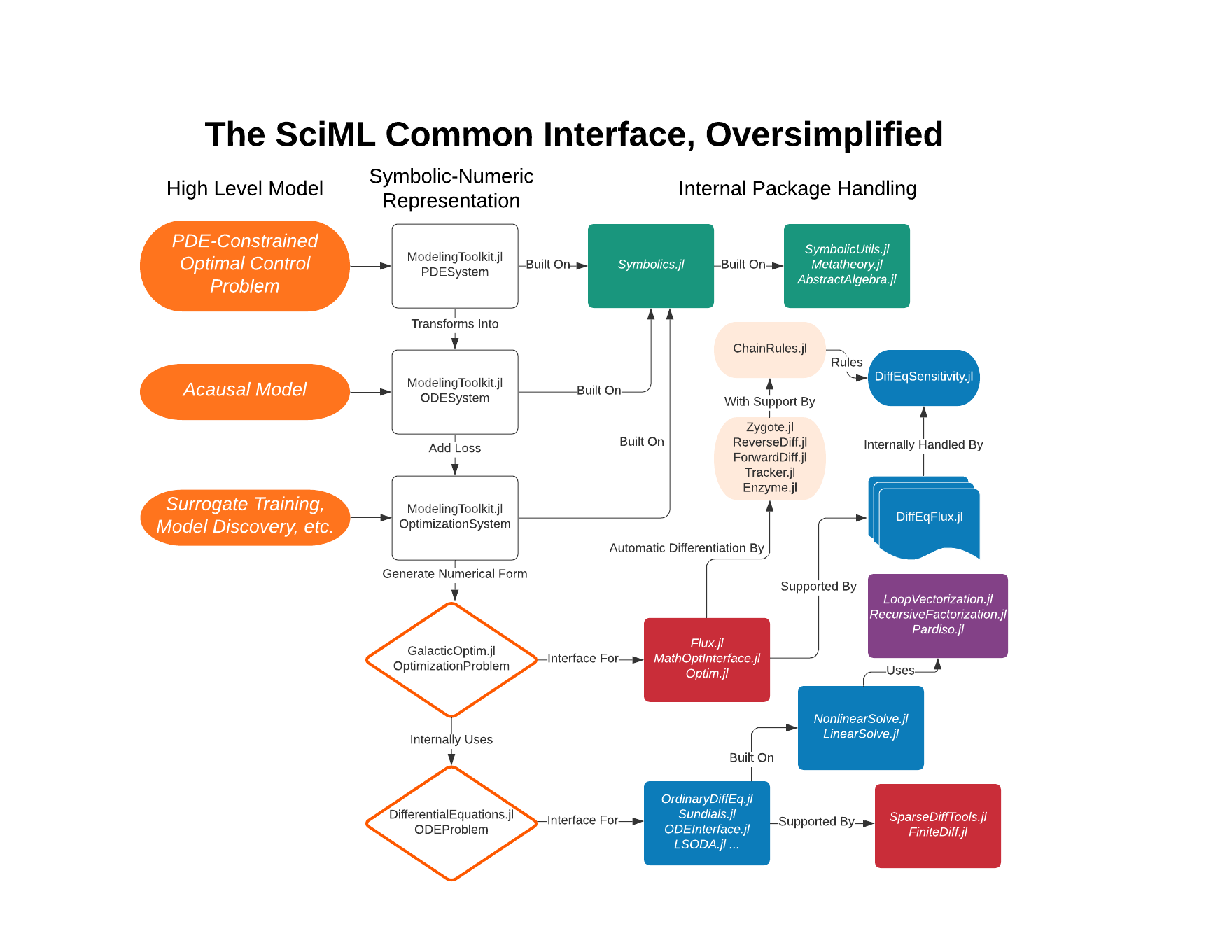julia> sol = solve(prob,EM(),dt=dt);
julia> length(sol.u), length(sol.u_analytic)
(17, 17)
julia> SciMLBase.calculate_solution_errors!(sol);
ERROR: DimensionMismatch("dimensions must match: a has dims (Base.OneTo(17),), b has dims (Base.OneTo(34),), mismatch at 1")
Stacktrace:
[1] promote_shape
@ ./indices.jl:178 [inlined]
[2] promote_shape
@ ./indices.jl:169 [inlined]
[3] -(A::Vector{Float64}, B::Vector{Float64})
@ Base ./arraymath.jl:38
[4] calculate_solution_errors!(sol::RODESolution{Float64, 1, Vector{Float64}, Vector{Float64}, Dict{Symbol, Float64}, Vector{Float64}, NoiseProcess{Float64, 1, Float64, Float64, Nothing, Nothing, typeof(DiffEqNoiseProcess.WHITE_NOISE_DIST), typeof(DiffEqNoiseProcess.WHITE_NOISE_BRIDGE), false, ResettableStacks.ResettableStack{Tuple{Float64, Float64, Nothing}, false}, ResettableStacks.ResettableStack{Tuple{Float64, Float64, Nothing}, false}, RSWM{Float64}, Nothing, RandomNumbers.Xorshifts.Xoroshiro128Plus}, SDEProblem{Float64, Tuple{Float64, Float64}, false, SciMLBase.NullParameters, Nothing, SDEFunction{false, typeof(f), typeof(g), LinearAlgebra.UniformScaling{Bool}, typeof(f_analytic), Nothing, Nothing, Nothing, Nothing, Nothing, Nothing, Nothing, Nothing, Nothing, Nothing, Nothing, typeof(SciMLBase.DEFAULT_OBSERVED), Nothing}, typeof(g), Base.Pairs{Symbol, Union{}, Tuple{}, NamedTuple{(), Tuple{}}}, Nothing}, EM{true}, StochasticDiffEq.LinearInterpolationData{Vector{Float64}, Vector{Float64}}, DiffEqBase.DEStats}; fill_uanalytic::Bool, timeseries_errors::Bool, dense_errors::Bool)
@ SciMLBase ~/Documents/git_repositories/julia/SciMLBase/src/solutions/rode_solutions.jl:132
[5] calculate_solution_errors!(sol::RODESolution{Float64, 1, Vector{Float64}, Vector{Float64}, Dict{Symbol, Float64}, Vector{Float64}, NoiseProcess{Float64, 1, Float64, Float64, Nothing, Nothing, typeof(DiffEqNoiseProcess.WHITE_NOISE_DIST), typeof(DiffEqNoiseProcess.WHITE_NOISE_BRIDGE), false, ResettableStacks.ResettableStack{Tuple{Float64, Float64, Nothing}, false}, ResettableStacks.ResettableStack{Tuple{Float64, Float64, Nothing}, false}, RSWM{Float64}, Nothing, RandomNumbers.Xorshifts.Xoroshiro128Plus}, SDEProblem{Float64, Tuple{Float64, Float64}, false, SciMLBase.NullParameters, Nothing, SDEFunction{false, typeof(f), typeof(g), LinearAlgebra.UniformScaling{Bool}, typeof(f_analytic), Nothing, Nothing, Nothing, Nothing, Nothing, Nothing, Nothing, Nothing, Nothing, Nothing, Nothing, typeof(SciMLBase.DEFAULT_OBSERVED), Nothing}, typeof(g), Base.Pairs{Symbol, Union{}, Tuple{}, NamedTuple{(), Tuple{}}}, Nothing}, EM{true}, StochasticDiffEq.LinearInterpolationData{Vector{Float64}, Vector{Float64}}, DiffEqBase.DEStats})
@ SciMLBase ~/Documents/git_repositories/julia/SciMLBase/src/solutions/rode_solutions.jl:110
[6] top-level scope
@ REPL[21]:1
julia> length(sol.u), length(sol.u_analytic)
(17, 34)
julia> SciMLBase.calculate_solution_errors!(sol);
ERROR: DimensionMismatch("dimensions must match: a has dims (Base.OneTo(17),), b has dims (Base.OneTo(51),), mismatch at 1")
Stacktrace:
[1] promote_shape
@ ./indices.jl:178 [inlined]
[2] promote_shape
@ ./indices.jl:169 [inlined]
[3] -(A::Vector{Float64}, B::Vector{Float64})
@ Base ./arraymath.jl:38
[4] calculate_solution_errors!(sol::RODESolution{Float64, 1, Vector{Float64}, Vector{Float64}, Dict{Symbol, Float64}, Vector{Float64}, NoiseProcess{Float64, 1, Float64, Float64, Nothing, Nothing, typeof(DiffEqNoiseProcess.WHITE_NOISE_DIST), typeof(DiffEqNoiseProcess.WHITE_NOISE_BRIDGE), false, ResettableStacks.ResettableStack{Tuple{Float64, Float64, Nothing}, false}, ResettableStacks.ResettableStack{Tuple{Float64, Float64, Nothing}, false}, RSWM{Float64}, Nothing, RandomNumbers.Xorshifts.Xoroshiro128Plus}, SDEProblem{Float64, Tuple{Float64, Float64}, false, SciMLBase.NullParameters, Nothing, SDEFunction{false, typeof(f), typeof(g), LinearAlgebra.UniformScaling{Bool}, typeof(f_analytic), Nothing, Nothing, Nothing, Nothing, Nothing, Nothing, Nothing, Nothing, Nothing, Nothing, Nothing, typeof(SciMLBase.DEFAULT_OBSERVED), Nothing}, typeof(g), Base.Pairs{Symbol, Union{}, Tuple{}, NamedTuple{(), Tuple{}}}, Nothing}, EM{true}, StochasticDiffEq.LinearInterpolationData{Vector{Float64}, Vector{Float64}}, DiffEqBase.DEStats}; fill_uanalytic::Bool, timeseries_errors::Bool, dense_errors::Bool)
@ SciMLBase ~/Documents/git_repositories/julia/SciMLBase/src/solutions/rode_solutions.jl:132
[5] calculate_solution_errors!(sol::RODESolution{Float64, 1, Vector{Float64}, Vector{Float64}, Dict{Symbol, Float64}, Vector{Float64}, NoiseProcess{Float64, 1, Float64, Float64, Nothing, Nothing, typeof(DiffEqNoiseProcess.WHITE_NOISE_DIST), typeof(DiffEqNoiseProcess.WHITE_NOISE_BRIDGE), false, ResettableStacks.ResettableStack{Tuple{Float64, Float64, Nothing}, false}, ResettableStacks.ResettableStack{Tuple{Float64, Float64, Nothing}, false}, RSWM{Float64}, Nothing, RandomNumbers.Xorshifts.Xoroshiro128Plus}, SDEProblem{Float64, Tuple{Float64, Float64}, false, SciMLBase.NullParameters, Nothing, SDEFunction{false, typeof(f), typeof(g), LinearAlgebra.UniformScaling{Bool}, typeof(f_analytic), Nothing, Nothing, Nothing, Nothing, Nothing, Nothing, Nothing, Nothing, Nothing, Nothing, Nothing, typeof(SciMLBase.DEFAULT_OBSERVED), Nothing}, typeof(g), Base.Pairs{Symbol, Union{}, Tuple{}, NamedTuple{(), Tuple{}}}, Nothing}, EM{true}, StochasticDiffEq.LinearInterpolationData{Vector{Float64}, Vector{Float64}}, DiffEqBase.DEStats})
@ SciMLBase ~/Documents/git_repositories/julia/SciMLBase/src/solutions/rode_solutions.jl:110
[6] top-level scope
@ REPL[23]:1
julia> length(sol.u), length(sol.u_analytic)
(17, 51)







